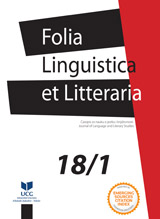ANDREAS OKOPENKO, DIE ÖSTERREICHISCHE NACHKRIEGSLITERATUR UND DAS POLITISCHE
ANDREAS OKOPENKO, THE AUSTRIAN POSTWAR LITERATURE AND THE POLITIC MATTER
Author(s): Arno Herberth, Laura TezarekSubject(s): Political history, Comparative Study of Literature, Austrian Literature, Theory of Literature
Published by: Filološki fakultet, Nikšić
Keywords: Avant-garde; Austrian Avant-garde; experimental writing; montage; aleatorics; a-linearity; Tristram Shandy; Andreas Okopenko;
Summary/Abstract: Art and literature have always played a subordinated function in autocratic types of government, fostering the doctrines laid down by a central power. In the literary era of enlightenment, romanticism and modernity, strong eruptive forces appeared that oppose traditional literary genres of the classical representative system. Surrealistic plays on words took those counter movements to extremes by claiming equal status for linguistic signs, regardless of their semantic content. After the catastrophe of the Second World War, Austrian writers adopted these radical concepts of classical modernity. However, Andreas Okopenko’s (1930–2010) position is not easy to define and does not fall into a particular literary trend or school of thought. He does not affiliate with a more radical avant-garde, such as the “Wiener Gruppe”, but also distances himself from conservative and unprogressive trends in Austrian literature in the 1950s and 60s. Although his work is provocative with regard to formal aspects it does reflect socio-critical and political awareness.
Journal: Folia Linguistica et Litteraria
- Issue Year: 2017
- Issue No: 18/1
- Page Range: 129-141
- Page Count: 13
- Language: German

